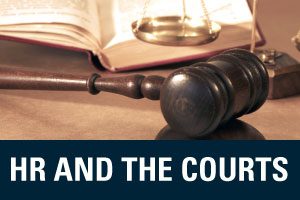HR and the Courts
Each month, CUPA-HR General Counsel Ira Shepard provides an overview of several labor and employment law cases and regulatory actions with implications for the higher ed workplace. Here’s the latest from Ira.
U.S. Supreme Court Rules Against NCAA in Antitrust Lawsuit, Opening the Path to More Compensation for Student-Athletes
On June 21, the U.S. Supreme Court ruled against the National Collegiate Athletic Association (NCAA) in a landmark antitrust lawsuit, reversing prior precedent and opening the door for colleges and universities to provide “educational benefits” to athletes who were previously barred or limited by NCAA rules. In a unanimous decision written by Justice Gorsuch, the Supreme Court affirmed the Ninth Circuit Court of Appeals decision that the court should apply a “rule of reason” analysis to future disputes brought by student-athletes.
The decision opened the door to payment of educational benefits, such as reimbursement for computers, musical instruments, free tutoring, internship stipends and cash academic achievement awards. While the decision was narrowly focused on educational benefits, commentators have concluded that it could make a difference down the road for student-athletes trying to profit off their name, image and likeness (NIL). Nearly 20 states have passed laws in the past two years allowing student-athletes to earn money from third parties for NIL despite the NCAA’s conflicting “amateurism rules.”
U.S. Supreme Court to Decide Whether Emotional Distress Damages Are Compensable to Disability Plaintiffs Under the Americans with Disabilities Act (ADA) and Section 504 of the Rehab Act
The U.S. Supreme Court has agreed to decide whether emotional distress damages are available to discrimination victims under Section 504 of the Rehab Act and under the ADA to resolve a split in the federal appeals court circuits on this issue (Cummings v. Premier Rehab Keller, P.L.L.C. (U.S. No. 20-219 rev granted, 7/2/21)). The Fifth Circuit Court of Appeals (covering Texas, Louisiana and Mississippi) recently ruled that emotional distress damages are not available to disability discrimination victims, reasoning that these damages are not available in contract claims, which are akin to discrimination claims under the statutes.
The Fifth Circuit decision is at odds with an Eleventh Circuit decision (covering Alabama, Georgia and Florida) holding that emotional distress damages are frequently suffered by victims of discrimination and therefore are foreseeable by employers covered by these statutes.
The Supreme Court will address the conflict between the circuits on this issue next term. CUPA-HR will follow the Supreme Court’s action on this issue in the future and report on the ultimate resolution.
U.S. Supreme Court Refuses to Hear Appeal of City Employee Fired for Racist Slurs Posted on Facebook — Court of Appeals Decision Denying the Employee’s First Amendment Retaliatory Discharge Claim Stands
The U.S. Supreme Court will not consider whether a Nashville, Tennessee, municipal employee’s discharge violated her First Amendment free speech rights after she was terminated following the posting of “racist slurs” on her Facebook page after the 2016 presidential election (Bennett v. Metropolitan Government of Nashville ( U.S. No. 20-1078, cert denied, 6/21/21)). The Sixth Circuit Court of Appeals (covering Michigan, Ohio, Kentucky and Tennessee) rejected the employee’s First Amendment claim. The employee was terminated from her position at the Nashville Emergency Communication Center for posting comments about the racial composition of the electorate after the then-just-concluded presidential election.
In rejecting the employee’s First Amendment claim, the appeals court noted that while the comments were couched in political debate terms, the “racist” comments were not protected speech. The court also noted that if the Facebook post had been private and the employee had not identified herself as a municipal employee, her case would have been stronger. The city successfully argued that the balancing test was properly exercised in balancing the employee’s free speech rights against the government’s interest here.
White High School Football Coach Fails to Prove His Contract Non-Renewal Was Racially Motivated Following a 5-4 Board of Education Vote to Not Renew
The Eleventh Circuit Court of Appeals (covering Alabama, Georgia and Florida) affirmed dismissal of a former high school football coach’s discrimination claim that his contract renewal was racially motivated following a 5-4 board of education decision not to renew his contract. Five Black board members voted for non-renewal and the four White board members voted for renewal (Rodemaker v. Shumphard (11th Cir., No. 20-14746, unpublished 6/ 8/21)). The complaint alleged race discrimination under 42 U.S.C. Sections 1981 and 1983.
The court pointed out that the plaintiff did not allege that he was treated differently than any non-White employee. The court concluded that the fact that the board’s vote occurred along racial lines is not sufficient by itself to establish that the board discriminated against him because he is White. The plaintiff alleged that the African American members of the board met privately. However, the court of appeals pointed out that the plaintiff did not allege that the meeting violated any law. Finally, the court pointed out that the plaintiff failed to allege any facts regarding his successor other than an allegation that he believed the board intended to replace him with a Black coach.
EEOC Opposes Religious Class Action Challenging LGBT Rights
The EEOC has opposed the religious class action filed in federal court in Texas attempting to exempt “all employers” from complying with federal LGBT protections if they have religious or non-religious objections to “homosexual or transgender behavior,” (U.S. Pastor Council v. Equal Employment Opportunity Commission (N.D. Tex., opp. to class certification)). The EEOC is arguing that such a case is not suitable for class status, as each case is different and must be decided on a case-by-case basis. The U.S. Supreme Court is ruling in favor of LGBT protections under Title VII in the Bostock v. Clayton County case, leaving open whether religion can be used to bypass discrimination laws.



